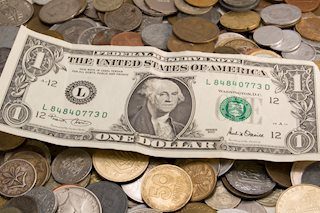Forex Today: Dollar revives, but not out of the woods
|
Here is what you need to know for next week:
Markets are offering mixed signs amid an uncertain outlook. Not even central bankers know what to do next. After crucial economic data from the US, what is clear is that the economy is softening and inflation is slowing down. Another week went without a banking failure.
The US Dollar staged a strong recovery on Friday, trimming weekly losses. Despite the revival, the trend remains down. Expectations point to one last rate hike by the Federal Reserve (Fed) in May and a long pause, before rate cuts. The bond market sees a recession ahead and, by the end of the year, lower interest rates than the current ones.
Next week, the S&P Global PMIs will offer the first glance of economic activity during April across the globe, an essential report in times of concerns about growth and central banks' "data-dependence". Growth data from China will show the extent of re-opening. The latest export data was encouraging, helping global risk sentiment.
The US Dollar Index dropped for the fifth consecutive week and posted the lowest weekly close since May. The DXY closed above 101.50, far from the lows, a positive sign for the US Dollar that does not suggest a reversal yet, but could point to a consolidation.
As has been the case since late February, EUR/USD rose for another week, and reached the highest level in a year above 1.1000. The trend is still up, but some exhaustion signs are spotted. Eurozone's PMIs next week could be critical for European Central Bank (ECB) expectations. Markets see the ECB raising rates further, but weak numbers could change the outlook for the second half of the year.
GBP/USD ended flat around 1.2400 after retreating from a multi-month high above 1.2500. The deterioration in risk sentiment on Friday weighed on the Pound, which lagged the Euro. EUR/GBP posted the highest weekly close since February above 0.8850. Critical UK data is due next week, with job numbers and consumer inflation.
USD/JPY finished the week little changed, with modest gains near the 133.00 area. The Japanese Yen lost strength amid risk appetite and after hopes for a turnaround in Bank of Japan's (BoJ) monetary policy stance vanished following the first press conference of Kazuo Ueda, the new governor.
USD/CHF continued to slide and broke decisively under 0.9000, to hit the weakest level since January 2021. The Swiss Franc and the Loonie were the top performers in the G10 space. USD/CAD bottomed around 1.3300, the lowest since February, then rebounded to 1.3400, to end the week with a loss of 140 pips. Next week, consumer inflation (Tuesday) and retail sales (Friday) are due in Canada.
When it looked like AUD/USD was ready for a run above 0.6800, it retreated, holding in the familiar range near 0.6700. This week's data showed strength in the labor market. The Reserve Bank of Australia (RBA) is still seen on hold at the next meeting. Next Tuesday, the central bank will release the minutes with details on the decision to pause the tightening cycle.
NZD/USD continued to retreat from the peak at 0.6378, which followed the Reserve Bank of New Zealand (RBNZ) 50 basis point rate hike, and ended near 0.6200. New Zealand's Q1 inflation is due on Thursday.
Latin American currencies were the best weekly performers despite falling on Friday. The Colombian Peso and the Chilean Peso gained more than 2.5% each versus the US Dollar.
Gold looked at record highs and blinked, retreating on Friday to $2,000. The trend is still to the upside, but the sharp correction raises doubts about the short-term bullish potential. Silver lost 2% on Friday, trimming some of its weekly gains, but still scoring the fifth advance in a row.
Bitcoin gained 8% during the week and it was holding above $30,000 at the highest level since June 2022.
Like this article? Help us with some feedback by answering this survey:
Information on these pages contains forward-looking statements that involve risks and uncertainties. Markets and instruments profiled on this page are for informational purposes only and should not in any way come across as a recommendation to buy or sell in these assets. You should do your own thorough research before making any investment decisions. FXStreet does not in any way guarantee that this information is free from mistakes, errors, or material misstatements. It also does not guarantee that this information is of a timely nature. Investing in Open Markets involves a great deal of risk, including the loss of all or a portion of your investment, as well as emotional distress. All risks, losses and costs associated with investing, including total loss of principal, are your responsibility. The views and opinions expressed in this article are those of the authors and do not necessarily reflect the official policy or position of FXStreet nor its advertisers.